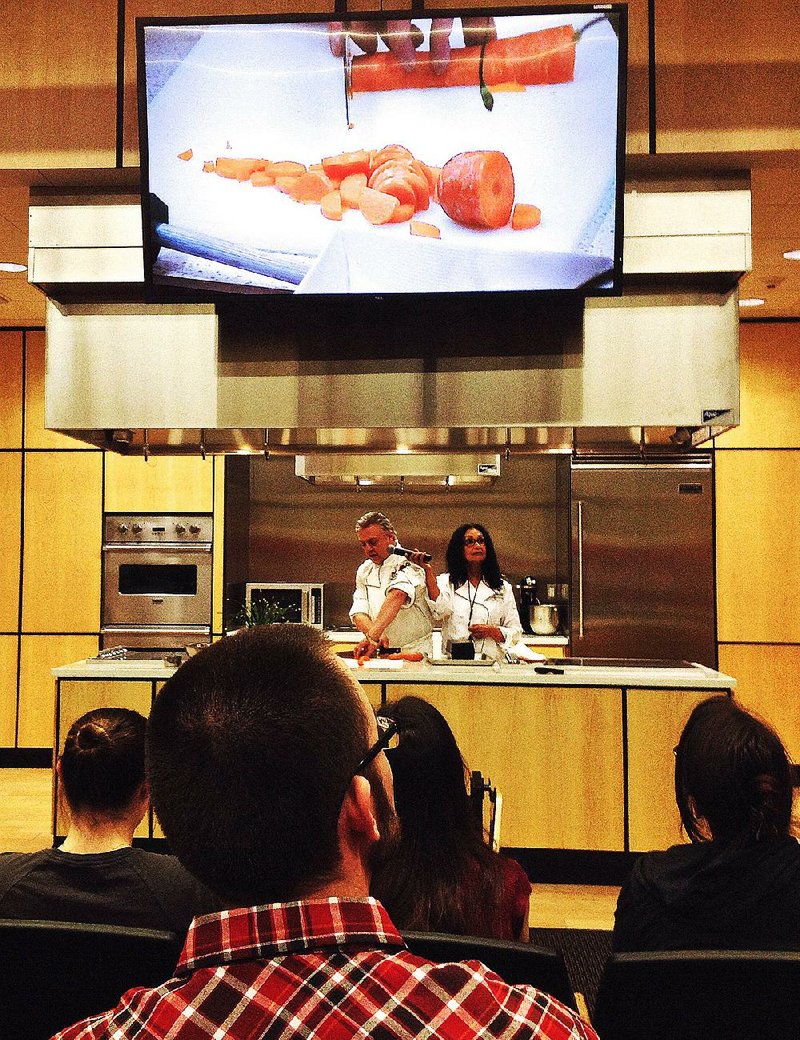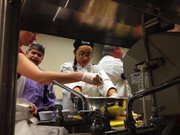The menu was speckled with whole grains and dripping with oil when future chefs and their teachers got together Jan. 30 with future doctors, pharmacists and nurses for "Food as Medicine," a dinner seminar about the evidence-based Mediterranean diet.
Many of the 66 participants brought knives to the four-hour program, a collaboration between the Integrative Medicine Interest Group (a campus club at the University of Arkansas for Medical Sciences) and the Pulaski Tech Culinary Arts and Hospitality Management Institute's Healthy Foods and Nutrition class.
And they did get to use those knives. But first, second-year med student Christina Tripsas introduced the evening's education, including talks by the teachers of the Healthy Foods class, Dr. Meenakshi Budhraja, a gastroenterologist, and registered dietitian Meghan Dixon.
Budhraja gave a wide-ranging talk about why today's doctors should want to understand the role food plays in the most common diseases. She talked about research that suggests eating less meat and increasing the amount of plants in the diet combats obesity, heart disease, diabetes and other diseases.
"There's no reason to be eating meat three times a day," she said.
While eating a plant-based diet is healthful, she said, people who eschew all animal foods can run low on vitamin B-12 and should take a supplement; meanwhile, the Mediterranean diet doesn't eliminate them but drastically reduces their use, which she said is a common-sense alternative.
According to one of the evening's handouts ("Primary Prevention of Cardiovascular Disease With a Mediterranean Diet," reprinted from The New England Journal of Medicine), the Mediterranean diet entails "a high intake of olive oil, fruit, nuts, vegetables, and cereals; a moderate intake of fish and poultry; a low intake of dairy products, red meat, processed meats, and sweets; and wine in moderation, consumed with meals."
"The cool thing about the Mediterranean diet," Dixon said, "it's flexible. It's not saying no. ... It's not cut and dried."
Among the evening's three main recommendations, she said, was that people eliminate all sweetened beverages, avoid snacking and learn how to cook.
"These skills, cooking skills, are really life-changing," she said. "These are the skills that develop lasting lifestyle changes for people. ... If you learn how to cook you're not outsourcing your health. ... You know what's in your food, you know how it's prepared."
Pulaski Tech's Chef Philippe Ducrot lectured the group on the use of the chef's knife, specifically how to avoid slicing off their
index fingers. And then the audience broke into groups of seven and adjourned to the culinary institute's large food-production kitchen classroom, where the knives came out.
Participants socialized while chopping, slicing and figuring out how to work large food processors and where to discard the peels and stems (the institute composts all food scraps). Wine flowed freely as the teams cooked 10 items that exemplified the tastiness Budhraja had promised they would find in Mediterranean fare.
The buffet was ready about 7 p.m. The cooks sat down to sample their own Green Goddess Hummus; muhammara (roasted red pepper and walnut dip); pea, edamame, chili and coconut soup -- which was green; Moroccan fava bean and vegetable soup -- which was orange; wild mushroom, lentil and olive burgers with cashew garlic sauce; quick pickled onions; roasted vegetable and sorghum salad; roasted salmon filets; and orange walnut olive oil cake with sweet yogurt.
"You have to taste their cake," said lentil-burger team member Stephen Foster, pointing to another team's work station and its plate stacked with tiers of tan rectangles. "It's an oil cake. An oil cake."
The UAMS Integrative Medicine Interest Group is a campus club at the University of Arkansas for Medical Sciences that's also open to interested members of the public. As described on the university's website, the group aims to introduce medical students to "the methods of healing that complement our education and training in western allopathic medicine. This programming is intended to improve student wellness and help students see the possibilities in integrating these ideas into their future practices."
The group's adviser is Dr. Henri Roca III, program manager for the integrative medicine primary care team at Central Arkansas Veterans Administration Hospital Services.
Tripsas said she finds the idea of fusing medical science with culinary science exciting, and she hopes that teaching kitchens could become a standard feature of medical education.
The evening cost $40 for UAMS students, faculty and affiliates, $50 for other guests. "We are hoping this might be the first of many," Tripsas said.
ActiveStyle on 02/08/2016


